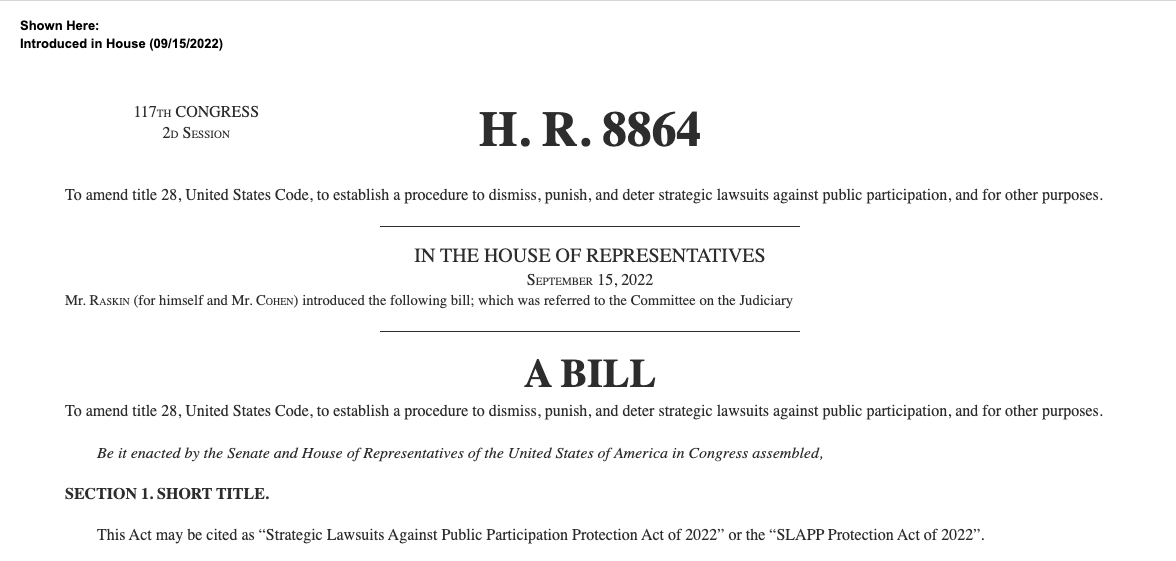On December 5, 2024, Representatives Jamie Raskin (MD-08) and Kevin Kiley (CA-03) introduced the Free Speech Protection Act, bipartisan legislation to protect individuals and organizations from frivolous lawsuits designed to chill free speech and political action. Senator Ron Wyden (D-OR) leads companion legislation in the Senate.
Read MoreThe Public Participation Project is excited to report that Representative Jamie Raskin has introduced the SLAPP Protection Act of 2022, H.R. 8864, a bill aiming to curtail meritless anti-speech lawsuits at the federal level.
Read MoreAt a hearing held by Rep. Jamie Raskin, members of the House Subcommittee on Civil Rights and Civil Liberties discussed whether fossil fuel companies use SLAPPs to intimidate free speech. Raskin noted that through these suits, individuals and civic groups who speak on climate-related issues can face expensive and protracted litigation levelled by the corporations. Read more about the discussion, which touched on global and domestic activism and the need for a federal anti-SLAPP law, in the House press release.
Read MoreThe 116th Congress introduced the Citizens Participation Act of 2020 in aims of federal anti-SLAPP protections.
Read MoreLast night, John Oliver devoted 26 minutes of his show to explain the importance of anti-SLAPP legislation and PPP’s efforts to fight SLAPPs across the country.
Read MorePPP Policy Director, Evan Mascagni, co-authored a piece with Julio Sharp-Wasserman on Techidrt about how federal anti-SLAPP legislation would make CDA 230 more effective.
Read MoreIn the final post of a three-part series from guest contributor Leslie Paul Machado, Chair of LeClairRyan's Media, Internet and E-commerce Industry Team, Mr. Machado discusses the impact of these decisions on the legal landscape and the need for a federal anti-SLAPP law.
Read MoreIn the second post of a three-part series from guest contributor Leslie Paul Machado, Chair of LeClairRyan's Media, Internet and E-commerce Industry Team, Mr. Machado discusses the D.C. Circuit's decision on whether the D.C. anti-SLAPP statute can be used in federal diversity cases.
Read MoreIn the first post of a three-part series from guest contributor Leslie Paul Machado, Chair of LeClairRyan's Media, Internet and E-commerce Industry Team, Mr. Machado discusses the background of the D.C. anti-SLAPP statute.
Read MoreMike Masnick at Techdirt discusses SCOTUS nominee Brett Kavanaugh’s opinion on anti-SLAPP laws.
Read MoreAfter more than a year of waiting, Congress has finally okayed a piece of legislation that, if signed by the president, will stop companies from using so-called “non-disparagement” or “gag” clauses to prevent or discourage customers from writing honest reviews.
Read MoreFrom Sasha Moss at R Street: Donald Trump has promised that if he becomes president, he’s going to “open up those libel laws so when The New York Times writes a hit piece we can sue them and win money.” To date, he’s already filed six libel suits. Highlights include his recent suit against Timothy O’Brien, author of “Trump Nation,” for asserting his net worth isn’t as high as Trump claimed it is, and toward comedian Bill Maher, who requested Trump prove he’s not the “spawn of an orangutan.”
Read MorePPP Board Member Jeremy Rosen recently authored an Op-Ed for the Hill advocating for enactment of the Speak Free Act.
"The SPEAK FREE Act provides a mechanism for federal courts to promptly dismiss those baseless lawsuits that are designed to punish people for speaking out."
Read More
Since the introduction of the SPEAK FREE Act of 2015 in May, momentum has been building to enact this important legislation. The bill now has more than 30 co-sponsors in the House and there was a hearing in the House Judiciary Committee on June 22, 2016. You can view that hearing here.
Here is just some of the coverage that the Speak Free Act has been receiving:
Read More













